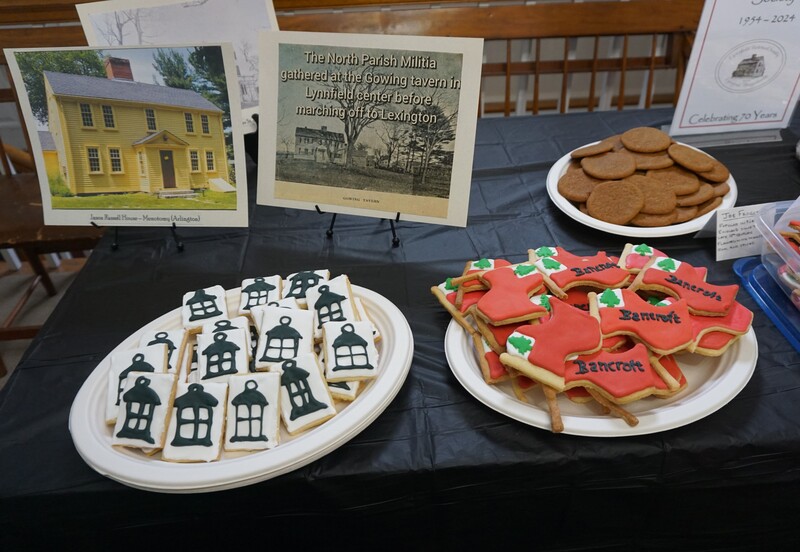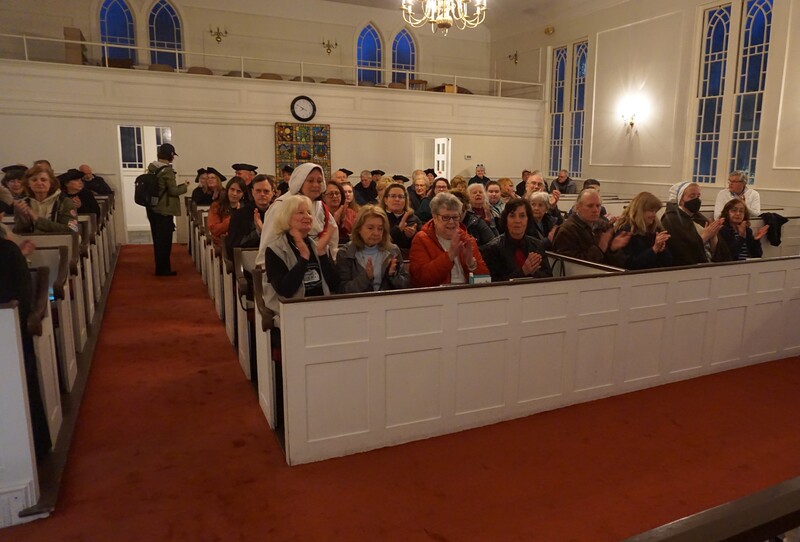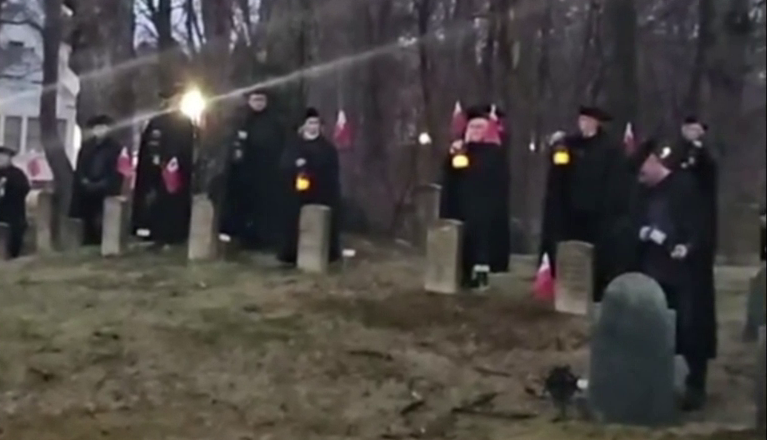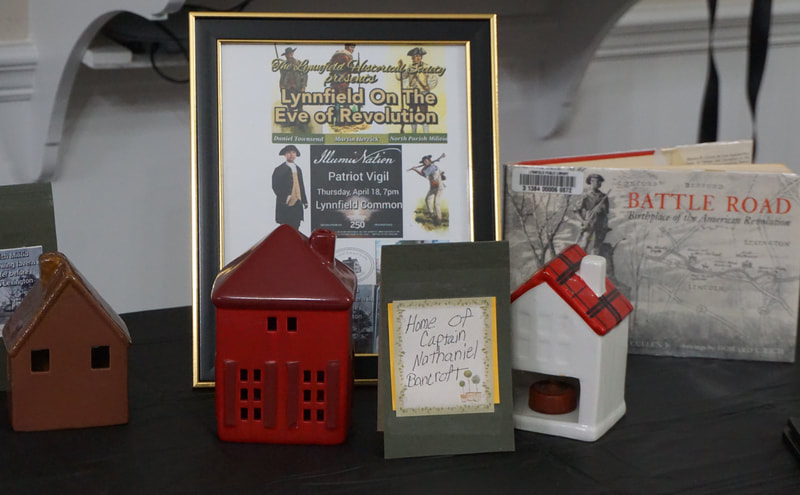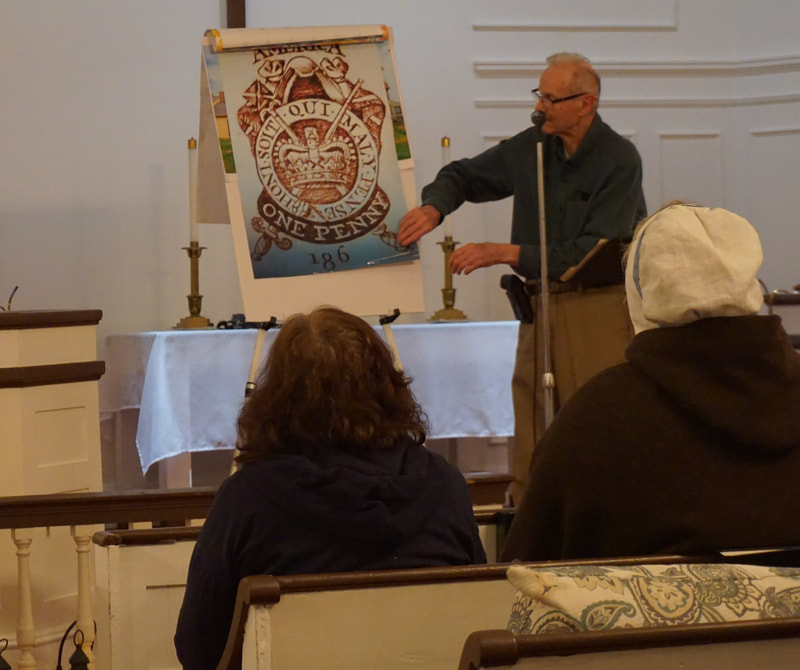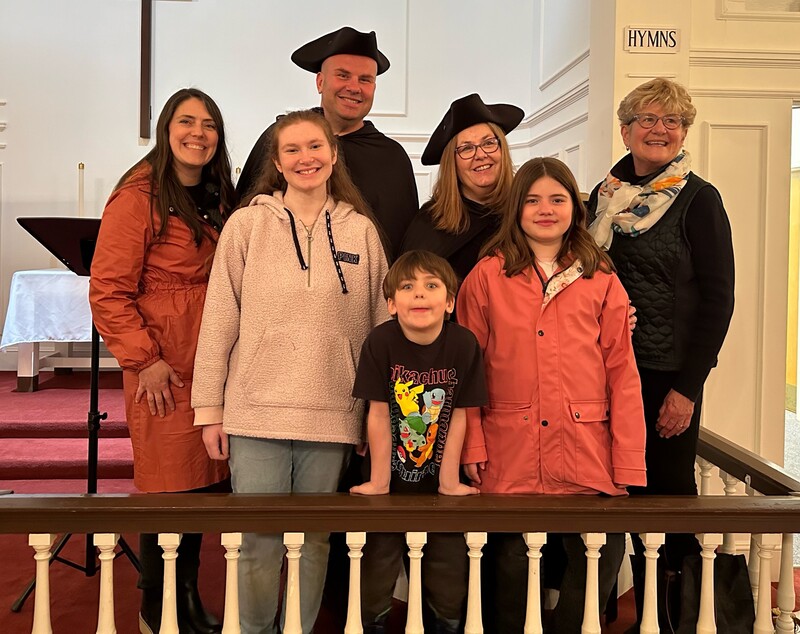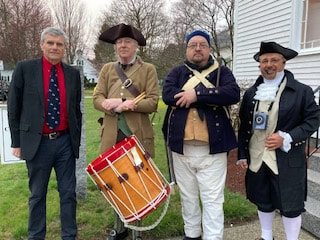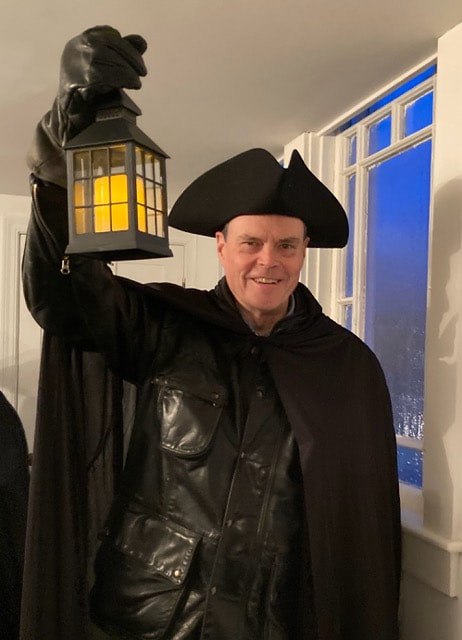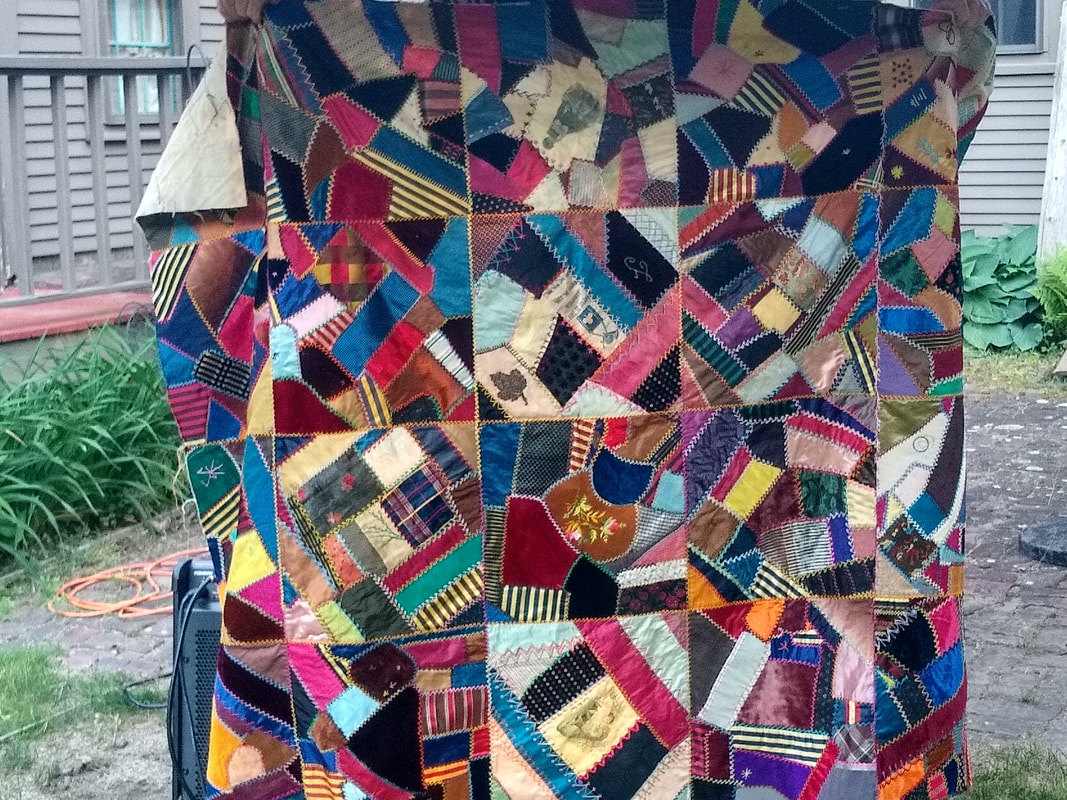UP NEXT:
Members only Pot Luck Dinner
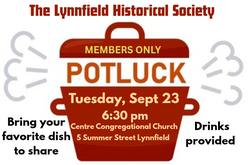
We will kick off our 2026 season on Tuesday, September 23rd at Center Congregational Church beginning at 6:30 with a members-only potluck dinner. We will review our 2025 events and plan out the upcoming schedule of speakers and more. Please bring a favorite dish to share and a hearty appetite.
Love Pot Luck and you have been meaning to join the Lynnfield Historical Society? Now would be a great time to sign-up.
Love Pot Luck and you have been meaning to join the Lynnfield Historical Society? Now would be a great time to sign-up.
Past events
Members Only (Join Here)
|

Lynnfield's Revolution 250
Took Place April 18th and 19th, 2025 We had a blast. Please see our Lynnfield Rev 250 Page for the full story |
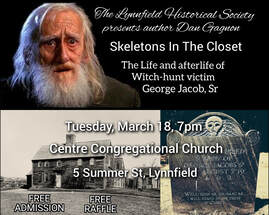
March 18: remembering the salem which trials, Dan Gagnon
“Skeletons in the Closet” was the subject of the 7 pm meeting of the Lynnfield Historical Society on Tuesday evening, March 18 at the Centre Congregational Church. Danvers resident and author Dan Gagnon was our guest speaker. He focused on the difference between the way Rebecca Nurse was memorialized, compared to a fellow-victim of the witchcraft mania, George Jacobs.
After the Witch Trials ended in the fall of 1692, Salem residents wanted to disassociate themselves with the madness. Its nineteen victims were buried in unmarked graves in and around “Salem Village,” now Danvers. In 1885 Rebecca Nurse’s descendants erected an impressive marble monument in her memory on the grounds of the Nurse Homestead in Danvers. Interest in Rebecca Nurse peaked in the 1950s when her “sainted” character was portrayed in Arthur Miller’s play The Crucible. In contrast, the remains of another victim, George Jacobs, lay buried in obscurity until they were accidentally exhumed in the 1950s.
Dan Gagnon has written a book about Rebecca Nurse, serves on the Board of Directors at the Nurse Homestead, and is the Chairman of Danvers Historic District Commission.
Refreshments will be served. The public was well represented and very welcome. There was no charge for this event.
Dan's talk was very interesting, containing information not commonly known. He graciously allowed us to film his entire talk which you can view on our YouTube channel Here
March 18: remembering the salem which trials, Dan Gagnon
“Skeletons in the Closet” was the subject of the 7 pm meeting of the Lynnfield Historical Society on Tuesday evening, March 18 at the Centre Congregational Church. Danvers resident and author Dan Gagnon was our guest speaker. He focused on the difference between the way Rebecca Nurse was memorialized, compared to a fellow-victim of the witchcraft mania, George Jacobs.
After the Witch Trials ended in the fall of 1692, Salem residents wanted to disassociate themselves with the madness. Its nineteen victims were buried in unmarked graves in and around “Salem Village,” now Danvers. In 1885 Rebecca Nurse’s descendants erected an impressive marble monument in her memory on the grounds of the Nurse Homestead in Danvers. Interest in Rebecca Nurse peaked in the 1950s when her “sainted” character was portrayed in Arthur Miller’s play The Crucible. In contrast, the remains of another victim, George Jacobs, lay buried in obscurity until they were accidentally exhumed in the 1950s.
Dan Gagnon has written a book about Rebecca Nurse, serves on the Board of Directors at the Nurse Homestead, and is the Chairman of Danvers Historic District Commission.
Refreshments will be served. The public was well represented and very welcome. There was no charge for this event.
Dan's talk was very interesting, containing information not commonly known. He graciously allowed us to film his entire talk which you can view on our YouTube channel Here
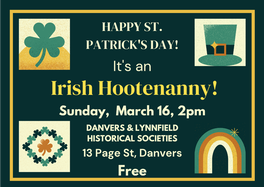
The Lynnfield Historical Society teamed up with the Danvers Historical Society to celebrate St. Patrick’s Day. We had a great turnout who enjoyed the Irish traditions as the Danvers Historical Society presented an afternoon of music and songs inspired by the Emerald Isle in “A musical Celebration of St. Patrick’s Day”. Vocals and music included selections spanning the centuries, from traditional Celtic tunes to songs composed in America inspired by Irish roots.
The first part of the program featured soloist, Darlene Wigton, who performed vocals with guitar accompaniment, and provided a bit of historical background for the traditional songs. Then the Tapley Hall Minstrels, featuring our own president, Ron Sarro, performed some well-known Irish favorites and toes were tapping.
Family and friends came to enjoy some Irish music and brought your voices! Song sheets were provided for the sing-along.
There were plenty of delicious Irish-themed refreshments served after the concert.
Thank you to the Danvers Historical Society for including the Lynnfield Historical Society in this wonderful event.
The first part of the program featured soloist, Darlene Wigton, who performed vocals with guitar accompaniment, and provided a bit of historical background for the traditional songs. Then the Tapley Hall Minstrels, featuring our own president, Ron Sarro, performed some well-known Irish favorites and toes were tapping.
Family and friends came to enjoy some Irish music and brought your voices! Song sheets were provided for the sing-along.
There were plenty of delicious Irish-themed refreshments served after the concert.
Thank you to the Danvers Historical Society for including the Lynnfield Historical Society in this wonderful event.
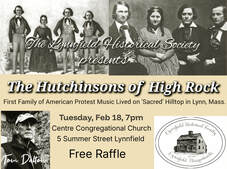
"The Hutchinsons of High Rock" was the subject at the 7pm meeting of the Lynnfield Historical Society on Tuesday evening, February 18 at the Centre Congregational Church. Lynnfield resident and author Tom Dalton was our guest speaker.
Tom Dalton is a former board member of the Lynn Historical Society and a retired journalist for The Daily Item and The Salem News. We are always happy to host such an entertaining and enlightening speaker.
Tom Dalton is a former board member of the Lynn Historical Society and a retired journalist for The Daily Item and The Salem News. We are always happy to host such an entertaining and enlightening speaker.
In the 1840s Jesse Hutchinson purchased several acres for a farm on High Rock, a rocky summit in Lynn with wide ocean views. He and his extended family lived there until the beginning of the 20th century. Four of his younger siblings formed a successful singing group that Jesse managed. The singers performed nationally protesting slavery, and later supported woman's suffrage here and abroad. They enjoyed international fame, appearing with abolitionist Fredrick Douglass and entertaining President Lincoln.
A stone cottage, built by the Hutchinson family, still stands on the site. An adjacent observation tower was burned down by revelers at the end of the Civil War. The family later bequeathed the parcel to the City of Lynn. In 1905 the present Romanesque High Rock Tower was erected on the property that became a city park for the public to enjoy.
Speaker Tom Dalton became interested in the story of the Hutchinson Family Singers while researching his recent book, "Fredrick Douglass: The Lynn Years." He explained that he found that the friendship between the Hutchinson family and Douglass to be fascinating given the racial strife of the 19th century. The audience eagerly listened and learned so much about this family and the times in which they lived-right next door!
As usual the refreshments were top notch and Shelley Lynch won the door prize: Tom's book in a hand-crafted(by Linda Gillon) book sack.
Mr. Dalton graciously permitted filming of his talk which we have added to our YouTube channel. You can view it Here
A stone cottage, built by the Hutchinson family, still stands on the site. An adjacent observation tower was burned down by revelers at the end of the Civil War. The family later bequeathed the parcel to the City of Lynn. In 1905 the present Romanesque High Rock Tower was erected on the property that became a city park for the public to enjoy.
Speaker Tom Dalton became interested in the story of the Hutchinson Family Singers while researching his recent book, "Fredrick Douglass: The Lynn Years." He explained that he found that the friendship between the Hutchinson family and Douglass to be fascinating given the racial strife of the 19th century. The audience eagerly listened and learned so much about this family and the times in which they lived-right next door!
As usual the refreshments were top notch and Shelley Lynch won the door prize: Tom's book in a hand-crafted(by Linda Gillon) book sack.
Mr. Dalton graciously permitted filming of his talk which we have added to our YouTube channel. You can view it Here
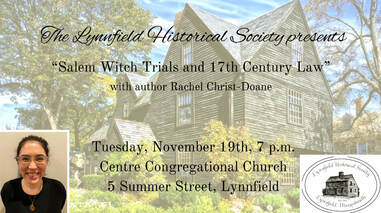
“The Salem Witch Trials and 17th Century Law” was the subject at the 7 PM meeting of the Lynnfield Historical Society on Tuesday, November 19 at the Centre Congregational Church in Lynnfield.
Rachel Christ-Doane, Director of Education at the Salem Witch Museum, was our guest speaker. She described the legal and political backdrop against which the Salem witch trials played out in 1692.
The Massachusetts Bay Colony had lost its Royal Charter a decade earlier because of its refusal to comply with the civil and business dictums of the Crown. The new charter of 1691 seriously curbed the power of Puritan clergy and magistrates under whose watch the witchcraft madness in Salem had begun. In the summer of 1692, nineteen victims were executed. Newly arrived Royal Governor Sir William Phips was shocked at the Salem proceedings, especially after his own wife was accused. He established a court that immediately dismissed “spectral evidence” - testimony from witnesses that the accused persons had appeared to them in dreams or visions to do them harm. By the fall of the year, the hysteria had died down and prisoners were released.
This presentation was the second of five evening programs on the Lynnfield Historical Society’s 2024-2025 calendar. Refreshments were served a-plenty. Nina Emery won the doorprize.
Rachel Christ-Doane, Director of Education at the Salem Witch Museum, was our guest speaker. She described the legal and political backdrop against which the Salem witch trials played out in 1692.
The Massachusetts Bay Colony had lost its Royal Charter a decade earlier because of its refusal to comply with the civil and business dictums of the Crown. The new charter of 1691 seriously curbed the power of Puritan clergy and magistrates under whose watch the witchcraft madness in Salem had begun. In the summer of 1692, nineteen victims were executed. Newly arrived Royal Governor Sir William Phips was shocked at the Salem proceedings, especially after his own wife was accused. He established a court that immediately dismissed “spectral evidence” - testimony from witnesses that the accused persons had appeared to them in dreams or visions to do them harm. By the fall of the year, the hysteria had died down and prisoners were released.
This presentation was the second of five evening programs on the Lynnfield Historical Society’s 2024-2025 calendar. Refreshments were served a-plenty. Nina Emery won the doorprize.
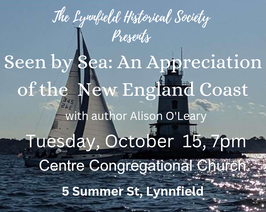
“Seen by Sea: An Appreciation of the New England Coast” was the topic of discussion at the Lynnfield Historical Society’s 7 PM meeting on Tuesday, October 15 at the Centre Congregational Church in Lynnfield. Writer, sailor, and outdoor adventurer Alison O’Leary was our guest speaker.
Alison described her five -week sailing excursion with her partner John Pike from Providence, Rhode Island to Bar Harbor Maine. They traveled in a 25- foot Catalina sail boat that she described as “something like camping at sea.” The trip provided a unique view of the rugged 700 -mile coast that also included an encounter with sharks.
We had a great turnout for a very entertaining presentation.
Alison described her five -week sailing excursion with her partner John Pike from Providence, Rhode Island to Bar Harbor Maine. They traveled in a 25- foot Catalina sail boat that she described as “something like camping at sea.” The trip provided a unique view of the rugged 700 -mile coast that also included an encounter with sharks.
We had a great turnout for a very entertaining presentation.
September 29, 2024 Discover Lynnfield with Trails and Sails: History Hike on Lower Main St.
Although this was a rain date Reschedule we had a great turnout and learned so much from Ron Sarro and Linda Gillon about: Partridge Island, Rombult's Grove, and the Joseph Henfield House. Bonus: we unveiled our 60 for the 70th Profiles of Lynnfield History.
Although this was a rain date Reschedule we had a great turnout and learned so much from Ron Sarro and Linda Gillon about: Partridge Island, Rombult's Grove, and the Joseph Henfield House. Bonus: we unveiled our 60 for the 70th Profiles of Lynnfield History.
September 14, 2024: Discover Lynnfield with Trails and Sails : History Hike at Kallenberg Quarry/Skull Cliff
April 18, 2024 7:00 pm
Watch Promotional Video Here
Lynnfield on the Eve of Revolution:
Daniel Townsend, Martin Herrick, and the North Parish Militia
The Lynnfield Historical Society is proud to commemorate the eve of the American Revolution and the bloody battle where three Lynnfield men died on the first day of the American Revolution, April 19, 1775. We hosted a solemn vigil in the Old Burying Ground, remembering those who fought.
Following the vigil we heard from Paul Hogman who enlightened us with the story of the North Parish Militia and the harrowing tragedy that occurred at the Jason Russel house.
In preparation for the 250th celebration of American Independence in 2026, the Lynnfield Historical Society hosted a two-part program on Thursday evening, April 18. The public was invited and they came. We gathered at 7 o’clock in front of the Centre Congregational Church. Rain was in the air so we quickly changed some of the plans: Our Town Crier, LHS President. led the audience in a round of Revolutionary Trivia while waiting out the dark clouds. We then had a performance of Fife and Drum in the Chapel. Our Master of Ceremonies for the evening was Alan Foulds, chairman of the Lynnfield Historical Society's Rev250 Committee. Alan gave greetings and an explanation of the night's program. He then introduced guest speakers, Lynnfield's Director of Veterans Services, Bruce Seigel and American Legion Post 131 Commander, Paul Bogart, both of whom spoke highly of the event and the society as well as the need to honor our veterans from all conflicts. At the conclusion of our guests' speeches and that of our MC, The fifer and drummer followed our Town Crier, leading a procession of eighteen volunteers, dressed in black capes and tri-cornered hats and carrying lanterns, across the Common to the Old Burial Ground. Each volunteer had been assigned a grave of a Revolutionary Soldier, marked with a custom made "Captain Bancroft's Company" flag. When the Town Crier read a name and rang his bell, the volunteer lit a lantern in honor of the fallen soldier.
We were fortunate to have located descendants from both the Townsend and Wellman families who honored us with their participation.
Following this vigil, we returned across the street to the Chapel of the Centre Congregational Church to hear local historian, Paul Hogman, speak about members of Lynnfield’s North Parish Militia. Heeding the call of Minuteman Martin Herrick, these volunteers left from the Gowing’s Tavern in town to join the fight at Menotomy (now Arlington) on April 19, 1775. There they engaged with tattered British Redcoats returning from the battles at Concord and Lexington. Three Lynnfield men died that day – Daniel Townsend who is buried in Lynnfield, along with William Flint and Thomas Hadley who were interred in present–day Arlington. A rugged local survivor who lived to tell the tale was Timothy Munroe who had many kinsmen fighting that day in Lexington.
This event was well attended. lynnfield Media Studios will produce their coverage for the public. Carolyn Sarro produced a Facebook Live Stream of the event which was edited for YouTube and can be viewed Here.
Light refreshments were served
April 18, 2024 7:00 pm
Watch Promotional Video Here
Lynnfield on the Eve of Revolution:
Daniel Townsend, Martin Herrick, and the North Parish Militia
The Lynnfield Historical Society is proud to commemorate the eve of the American Revolution and the bloody battle where three Lynnfield men died on the first day of the American Revolution, April 19, 1775. We hosted a solemn vigil in the Old Burying Ground, remembering those who fought.
Following the vigil we heard from Paul Hogman who enlightened us with the story of the North Parish Militia and the harrowing tragedy that occurred at the Jason Russel house.
In preparation for the 250th celebration of American Independence in 2026, the Lynnfield Historical Society hosted a two-part program on Thursday evening, April 18. The public was invited and they came. We gathered at 7 o’clock in front of the Centre Congregational Church. Rain was in the air so we quickly changed some of the plans: Our Town Crier, LHS President. led the audience in a round of Revolutionary Trivia while waiting out the dark clouds. We then had a performance of Fife and Drum in the Chapel. Our Master of Ceremonies for the evening was Alan Foulds, chairman of the Lynnfield Historical Society's Rev250 Committee. Alan gave greetings and an explanation of the night's program. He then introduced guest speakers, Lynnfield's Director of Veterans Services, Bruce Seigel and American Legion Post 131 Commander, Paul Bogart, both of whom spoke highly of the event and the society as well as the need to honor our veterans from all conflicts. At the conclusion of our guests' speeches and that of our MC, The fifer and drummer followed our Town Crier, leading a procession of eighteen volunteers, dressed in black capes and tri-cornered hats and carrying lanterns, across the Common to the Old Burial Ground. Each volunteer had been assigned a grave of a Revolutionary Soldier, marked with a custom made "Captain Bancroft's Company" flag. When the Town Crier read a name and rang his bell, the volunteer lit a lantern in honor of the fallen soldier.
We were fortunate to have located descendants from both the Townsend and Wellman families who honored us with their participation.
Following this vigil, we returned across the street to the Chapel of the Centre Congregational Church to hear local historian, Paul Hogman, speak about members of Lynnfield’s North Parish Militia. Heeding the call of Minuteman Martin Herrick, these volunteers left from the Gowing’s Tavern in town to join the fight at Menotomy (now Arlington) on April 19, 1775. There they engaged with tattered British Redcoats returning from the battles at Concord and Lexington. Three Lynnfield men died that day – Daniel Townsend who is buried in Lynnfield, along with William Flint and Thomas Hadley who were interred in present–day Arlington. A rugged local survivor who lived to tell the tale was Timothy Munroe who had many kinsmen fighting that day in Lexington.
This event was well attended. lynnfield Media Studios will produce their coverage for the public. Carolyn Sarro produced a Facebook Live Stream of the event which was edited for YouTube and can be viewed Here.
Light refreshments were served

March 19, 2024 7:00 pm
Our Guest Speaker, Abby Chandler, described the electrifying response to the Stamp Act drawn from her recent book, Seized with the Temper of the Times: Identity and Rebellion in Pre-Revolutionary America.
Ms. Chandler is Associate Professor of Early American History at the University of Massachusetts Lowell. She has published articles on political movements in eighteenth-century British North America in Early American Studies, Protest in the Long Eighteenth Century, and the North Carolina Historical Review. She is also serves on the 250th American Revolution Anniversary Commission in Massachusetts.
The Stamp Act of 1765, a decree passed by the British Parliament, required the colonists to pay a tax, represented by a stamp, on various forms of papers, documents, and playing cards. The Act became a fiery signpost on the road to the American Revolution. The furor against this demand raged locally in Massachusetts as it did in other colonies, particularly in Rhode Island and North Carolina. Abby took us there with her vivid accounts of friends and rivals of the time.
Excerpt from Westholme Publishing, regarding Ms. Chandler's latest book: In Seized with the Temper of the Times Identity and Rebellion in Pre-Revolutionary America, historian Abby Chandler explores, as never before, the complex local and transatlantic tensions which infused the early imperial crisis. She argues that colonial responses to the Stamp Act were rooted in local tensions and that the Regulator Rebellion was fueled by trans-Atlantic tensions. These two paradoxes, a local crisis cast as imperial affair and an imperial affair cast as local crisis, tell a very different story than the one to which we are accustomed. Without pre-existing local tensions, the fury of the Stamp Act crisis might not have spilled over during the summer of 1765, and, without the added strains of the imperial crisis, the Regulator Rebellion might not have lasted for five years. The questions about the intersecting roles of local and imperial/federal interests and identities raised during both the Stamp Act crisis and the Regulator Rebellion would also continue to inform political thought in Rhode Island and North Carolina in the coming decades. Both colonies had long histories of challenges to their autonomy and their residents embraced the coming revolution before many of their counterparts, but they would also be reluctant participants in the rising union envisioned by the framers of the Constitution.
Light refreshments were served.
Our Guest Speaker, Abby Chandler, described the electrifying response to the Stamp Act drawn from her recent book, Seized with the Temper of the Times: Identity and Rebellion in Pre-Revolutionary America.
Ms. Chandler is Associate Professor of Early American History at the University of Massachusetts Lowell. She has published articles on political movements in eighteenth-century British North America in Early American Studies, Protest in the Long Eighteenth Century, and the North Carolina Historical Review. She is also serves on the 250th American Revolution Anniversary Commission in Massachusetts.
The Stamp Act of 1765, a decree passed by the British Parliament, required the colonists to pay a tax, represented by a stamp, on various forms of papers, documents, and playing cards. The Act became a fiery signpost on the road to the American Revolution. The furor against this demand raged locally in Massachusetts as it did in other colonies, particularly in Rhode Island and North Carolina. Abby took us there with her vivid accounts of friends and rivals of the time.
Excerpt from Westholme Publishing, regarding Ms. Chandler's latest book: In Seized with the Temper of the Times Identity and Rebellion in Pre-Revolutionary America, historian Abby Chandler explores, as never before, the complex local and transatlantic tensions which infused the early imperial crisis. She argues that colonial responses to the Stamp Act were rooted in local tensions and that the Regulator Rebellion was fueled by trans-Atlantic tensions. These two paradoxes, a local crisis cast as imperial affair and an imperial affair cast as local crisis, tell a very different story than the one to which we are accustomed. Without pre-existing local tensions, the fury of the Stamp Act crisis might not have spilled over during the summer of 1765, and, without the added strains of the imperial crisis, the Regulator Rebellion might not have lasted for five years. The questions about the intersecting roles of local and imperial/federal interests and identities raised during both the Stamp Act crisis and the Regulator Rebellion would also continue to inform political thought in Rhode Island and North Carolina in the coming decades. Both colonies had long histories of challenges to their autonomy and their residents embraced the coming revolution before many of their counterparts, but they would also be reluctant participants in the rising union envisioned by the framers of the Constitution.
Light refreshments were served.
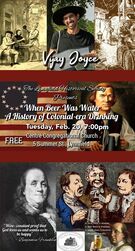
February 20, 2024:
“When Beer Was Water: A History of Colonial Era Drinking” was the subject at the Lynnfield Historical Society meeting at 7 PM on Tuesday evening, February 20 at the Centre Congregational Church.
Local historian Vijay Joyce of Beverly was our guest speaker. His career in historic preservation led to his interest in the lifestyle of our Colonial ancestors, particularly their imbibing habits.
Through his research, Joyce learned that alcohol consumption in early America was rampant. Beer was a major staple of everyday life. Because brewing required boiling water, beer was safer to drink since it did not cause waterborne diseases. Little was known about sanitation at the time. Equipment for home brewing and the establishment of a brew house were indispensable priorities in each new settlement. This penchant for alcohol continued well into the 19th century. Vijay was full of stories of the colonials and their drinking habits. His presentation included slides of paintings of raucous tavern scenes, examples of beer vessels, and quotes from the days when beer was water.
Mr. Joyce has a reputation for leading informative and entertaining walking tours. You can find out more about these at his website Rekindledhistory.com
February 20, 2024:
“When Beer Was Water: A History of Colonial Era Drinking” was the subject at the Lynnfield Historical Society meeting at 7 PM on Tuesday evening, February 20 at the Centre Congregational Church.
Local historian Vijay Joyce of Beverly was our guest speaker. His career in historic preservation led to his interest in the lifestyle of our Colonial ancestors, particularly their imbibing habits.
Through his research, Joyce learned that alcohol consumption in early America was rampant. Beer was a major staple of everyday life. Because brewing required boiling water, beer was safer to drink since it did not cause waterborne diseases. Little was known about sanitation at the time. Equipment for home brewing and the establishment of a brew house were indispensable priorities in each new settlement. This penchant for alcohol continued well into the 19th century. Vijay was full of stories of the colonials and their drinking habits. His presentation included slides of paintings of raucous tavern scenes, examples of beer vessels, and quotes from the days when beer was water.
Mr. Joyce has a reputation for leading informative and entertaining walking tours. You can find out more about these at his website Rekindledhistory.com
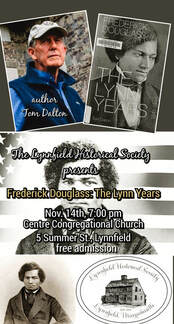
November 14, 2023
Author, Journalist, long-time Lynnfield resident, Tom Dalton, was our guest speaker at our November meeting. He presented his immense knowledge of the local history of world famous Frederick Douglass.
In anticipation of the 200th anniversary of Douglass’s birth in 2018, Dalton published Frederick Douglass: The Lynn Years (1841-1848). The author realized how little was known about the great man’s life during that formative period when he wrote Narrative of the Life of Frederick Douglass, an American Slave.
Douglass had been engaged by the Massachusetts Anti-Slavery Society, before the Civil War, to travel the country describing the horrors of the institution. Audiences were stunned at his oratorical skills and literary references so he wrote the Narrative to prove that, indeed, he had been raised as a slave. Douglass was self-taught after having learned to read by his mistress as a child.
Dalton was able to uncover many important aspects of Frederick Douglass’s life in those early years in Lynn that greatly enhance our local history. He introduced us to many characters that surrounded Douglass, including his wife, Anna Smith,
who managed their home in Lynn while the great orator was in demand all over.
You can watch a recording of This event on our YouTube Channel
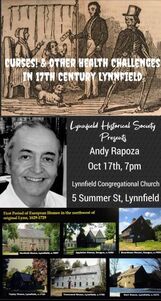
October 17, 2023:
We had another great turnout to hear our guest speaker, Andrew Rapoza. Andrew is the renowned author of a series of books, Promising Cures, chronicling the ways in which our forebears dealt with medical issues from the 17th century forward. He is a natural speaker, deeply versed in his subject. Of particular interest to last night's crowd was his intimate knowledge of evidence found in Lynnfield homes, which he shared, and which can be found in his books.
A huge thank you to Carolyn Sarro who created our Facebook Live video.
You can watch a recording of This event on our YouTube Channel
We had another great turnout to hear our guest speaker, Andrew Rapoza. Andrew is the renowned author of a series of books, Promising Cures, chronicling the ways in which our forebears dealt with medical issues from the 17th century forward. He is a natural speaker, deeply versed in his subject. Of particular interest to last night's crowd was his intimate knowledge of evidence found in Lynnfield homes, which he shared, and which can be found in his books.
A huge thank you to Carolyn Sarro who created our Facebook Live video.
You can watch a recording of This event on our YouTube Channel
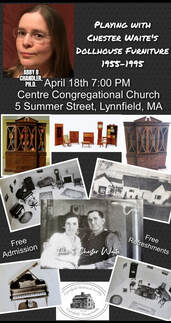
April 18, 2023:
Did you know that Lynnfield was famous for the manufacture of finely crafted doll house furniture? We so enjoyed learning more about Chester Waite, the master craftsman who created these tiny treasures. This informative presentation was presented by Abigail Chandler who grew up playing with her own heirloom collection of Waite furniture handed down to her by her mother.
This program took place at our April meeting on Tuesday, April 18th at 7PM at the Centre Congregational Church, 5 Summer St., Lynnfield.
Light refreshments were served following the presentation.
You can watch a recording of This event on our YouTube Channel
Did you know that Lynnfield was famous for the manufacture of finely crafted doll house furniture? We so enjoyed learning more about Chester Waite, the master craftsman who created these tiny treasures. This informative presentation was presented by Abigail Chandler who grew up playing with her own heirloom collection of Waite furniture handed down to her by her mother.
This program took place at our April meeting on Tuesday, April 18th at 7PM at the Centre Congregational Church, 5 Summer St., Lynnfield.
Light refreshments were served following the presentation.
You can watch a recording of This event on our YouTube Channel
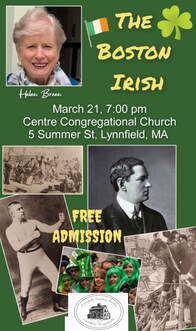
Helen Breen’s talk “The Boston Irish” captivated her entire audience, Irish and otherwise. Her in-depth insight into the impact of Irish immigration on the city of Boston, starting in the 1840’s, was both informative and entertaining.
Those remaining after Helen's presentation were treated to traditional Irish tunes presented by our favorite father and daughter duet: Ron and Carolyn Sarro.
Society president, Ron Sarro, also contributed to the St. Patrick's Day themed refreshments including Guiness samples (non-alcoholic, of course). It perfectly complemented the Irish soda bread, brownies, cookies and bread pudding among many other offerings. It is safe to assume no body went home hungry.
Helen Breen is a long time Lynnfield resident, a retired English teacher, and a substitute teacher for many years thereafter at Lynnfield Middle School and High School. Helen has written extensively in local publications about the history of Lynnfield, Essex County, and related historical subjects. Her presentation focused on the period of the Irish Potato Famine in the 1840s that occasioned the immigration of thousands of Irish to Boston, through their political ascendency in the 20th century, proudly culminating in the election of JFK in the early 1960s. Helen is a longtime member of the Lynnfield Historical Society as well as an elected member of the Massachusetts Historical Society and the Colonial Society of Massachusetts.
You can watch a recording of This event on our YouTube Channel
February 21, 2023: Our February Meeting was held at Center Congregational Church and featured guest speaker, Kate Anderson Benson.
Kate is the author of the Images of America volume, "Castle on the Hill" A Brief History of the Danvers State Hospital.
Kate is the author of the Images of America volume, "Castle on the Hill" A Brief History of the Danvers State Hospital.

Ms. Anderson's talk provided an overview of the rise and fall of one of the most significant landmarks in mental health history.
Danvers State Hospital, once a premier institution for the treatment of mental illness, has become a pop culture horror icon, the embodiment of the modern snake pit and the birthplace of the prefrontal lobotomy.
However, its legacy stretches far beyond its role in literature and film, and its impact on the evolution of mental health continues even today. Kate covered topics including the unique architecture, landmark medical treatments and practices (good and bad), farm and other work programs, and it's eventual decline and closure.
Danvers State Hospital, once a premier institution for the treatment of mental illness, has become a pop culture horror icon, the embodiment of the modern snake pit and the birthplace of the prefrontal lobotomy.
However, its legacy stretches far beyond its role in literature and film, and its impact on the evolution of mental health continues even today. Kate covered topics including the unique architecture, landmark medical treatments and practices (good and bad), farm and other work programs, and it's eventual decline and closure.
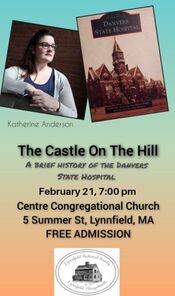
However, its legacy stretches far beyond its role in literature and film, and its impact on the evolution of mental health continues even today. Kate covered topics including the unique architecture, landmark medical treatments and practices (good and bad), farm and other work programs, and it's eventual decline and closure.
Kate graciously remained after her talk to sign copies of her book.
Call it Mardi Gras or Shrove Tuesday, any excuse will do, the refreshments provided by Linda Ladd and Ann Marie Pendola were striking with shades of teal and purple gracing an abundant spread.
Kate graciously remained after her talk to sign copies of her book.
Call it Mardi Gras or Shrove Tuesday, any excuse will do, the refreshments provided by Linda Ladd and Ann Marie Pendola were striking with shades of teal and purple gracing an abundant spread.
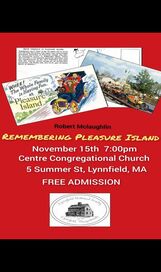
November 15, 2022: Our November Meeting will feature guest speaker, Robert McLaughlin, local author and theme park historian.
Did you know we had our very own Disney World knockoff right here in Reedy Meadow? Pleasure Island was a world class Adventure Park from 1959 to 1969 attracting many of the great entertainment acts of the day.
Billed as Boston’s answer to Disneyland, Pleasure Island drew thousands to enjoy its 80 acres of amusements, including a boat trip to Pirate Cove, a dizzying ride in the Slanty Shanty, and special visits by celebrities like Boomtown’s Rex Trailer.
Author and theme park historian Robert McLaughlin presented a lecture and slideshow about Pleasure Island, a 1960’s amusement park once located on the Wakefield Lynnfield line.
Bob is a Wakefield resident with an interest in local history. He has been researching Pleasure Island since 2000 and is cofounder of the Friends of Pleasure Island, which was established to collect images, film, oral history, and artifacts relating to the park. In his book “Pleasure Island” he has selected images from private collections and the Friends of Pleasure Island’s archives to tell the story of Wakefield’s own "Disneyland of the East".
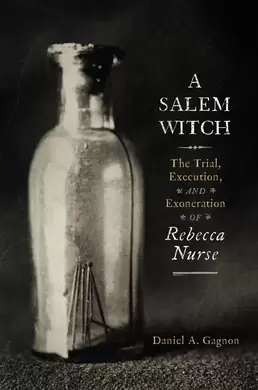
October 25, 2022: Our October Meeting featured guest speaker, Dan Gagnon, historian and author.
Our presentation took place in Richards Hall, Centre Congregational Church, Lynnfield and will begin at 7pm. Dan's talk entitled: A Salem Witch: The Life of Rebecca Nurse was timely, informative and entertaining.
Mr. Gagnon has garnered praise from Witch Trial experts including the following:
“Dan Gagnon has written a highly readable and first scholarly biography of Rebecca Nurse, perhaps the most famous of the Massachusetts Salem witchcraft victims of 1692. Meticulously researched, Gagnon traces the history and biography of Nurse and her family through their New World settlement; the dramatic events of her accusation, trial, and final execution; and the later remembrances of her and her legacy in today’s world. In telling the powerful story of Rebecca, Gagnon makes the complex history of the Salem witch trials more easily understood, while at the same time giving us a very good read.”
-Richard B. Trask, author of The Devil Hath Been Raised and Town Archivist of Danvers, Massachusetts (formerly known as Salem Village)
“Daniel Gagnon’s biography of Rebecca Nurse, A Salem Witch, places her life and continuing legacy as well as her death in thorough historical context, unravels some previous assumptions, and suggests new lines of inquiry. The bibliography and notes are valuable resources in themselves.”
– Marilynne K. Roach, author of The Salem Witch Trials, and Six Women of Salem
Dan is the author of A Salem Witch: The Trial, Execution, and Exoneration of Rebecca Nurse and has spent many years researching the Salem Village Witch-Hunt of 1692, and Danvers history in general. He serves on the board of directors of the Rebecca Nurse Homestead Museum in Danvers, is a member of the Danvers Historical Society, and serves on the Town of Danvers’ Salem Village Historic District Commission. He has shared his research through many in-person and online programs, and has served as a subject-matter expert for local media.
Dan is on Twitter: @dangagnonusa
Our presentation took place in Richards Hall, Centre Congregational Church, Lynnfield and will begin at 7pm. Dan's talk entitled: A Salem Witch: The Life of Rebecca Nurse was timely, informative and entertaining.
Mr. Gagnon has garnered praise from Witch Trial experts including the following:
“Dan Gagnon has written a highly readable and first scholarly biography of Rebecca Nurse, perhaps the most famous of the Massachusetts Salem witchcraft victims of 1692. Meticulously researched, Gagnon traces the history and biography of Nurse and her family through their New World settlement; the dramatic events of her accusation, trial, and final execution; and the later remembrances of her and her legacy in today’s world. In telling the powerful story of Rebecca, Gagnon makes the complex history of the Salem witch trials more easily understood, while at the same time giving us a very good read.”
-Richard B. Trask, author of The Devil Hath Been Raised and Town Archivist of Danvers, Massachusetts (formerly known as Salem Village)
“Daniel Gagnon’s biography of Rebecca Nurse, A Salem Witch, places her life and continuing legacy as well as her death in thorough historical context, unravels some previous assumptions, and suggests new lines of inquiry. The bibliography and notes are valuable resources in themselves.”
– Marilynne K. Roach, author of The Salem Witch Trials, and Six Women of Salem
Dan is the author of A Salem Witch: The Trial, Execution, and Exoneration of Rebecca Nurse and has spent many years researching the Salem Village Witch-Hunt of 1692, and Danvers history in general. He serves on the board of directors of the Rebecca Nurse Homestead Museum in Danvers, is a member of the Danvers Historical Society, and serves on the Town of Danvers’ Salem Village Historic District Commission. He has shared his research through many in-person and online programs, and has served as a subject-matter expert for local media.
Dan is on Twitter: @dangagnonusa
SEPTEMBER 20, 2020 Annual Pot Luck supper- Lynnfield Historical Society members only event was held downstairs in Richard Hall at Centre Church, 5 Summer Street, Lynnfield.
Members shared a wide variety of appetizers, entrees, and desserts, making the dinner a success.
It was great catching up with everyone and talking about our upcoming programs, including Pleasure Island, Danvers State hospital, Rebecca Nurse, Boston Irish and a talk about our newly acquired “Waite” dollhouse furniture. Our thanks to Mark Ingaciola and Mark Cellucci for their hard work and dedication to assembling such a diverse assortment of topics.
As an added bonus, we had wonderful background music provided to us by our President, Ron Sarro and his talented daughter, Carolyn.
Our new membership books were handed out. This year they are a bright Halloween orange with our new logo proudly displayed front and center. Any books that weren’t handed out at the supper will be put in the mail.
(Note: please submit corrections/additions to Linda Gillon at: thelynnfieldhistoricalsociety@gmail.com)
June 14, 2022 Annual Members Meeting and Pie Social
Held at the Historic Henfield House, 300 Main St., Lynnfield
Hosts: Bob and Linda Gillon
Hosts: Bob and Linda Gillon
Business Meeting:
During the business portion of the meeting, the membership unanimously approved revised by-laws as well as a new slate of officers.
Retiring president, Linda Gillon, was presented with a floral gift by vice president, Chris Noonan, in gratitude for her outstanding leadership and hard work on behalf of the society.
A moment of silence was observed in remembrance of recently deceased society members, Sandy Angus and George Weichert.
Retiring president, Linda Gillon, was presented with a floral gift by vice president, Chris Noonan, in gratitude for her outstanding leadership and hard work on behalf of the society.
A moment of silence was observed in remembrance of recently deceased society members, Sandy Angus and George Weichert.
Social:
Once business was concluded, refreshments in the form of coffee, ice cream, and a huge variety of fresh baked pies, were enjoyed by all.
Entertainment was offered by several members who recalled amusing stories of old Lynnfield. In addition, newly elected president, Ron Sarro, played guitar and sang oldies from the 50's and 60's.
Linda Gillion presented a beautiful civil-war era quilt (pictured below) that has been given to the society from a Hampstead, New Hampshire donor and relayed information about a future acquisition of a Lynnfield-origin wedding dress from a donor in Keene, New Hampshire.
Once business was concluded, refreshments in the form of coffee, ice cream, and a huge variety of fresh baked pies, were enjoyed by all.
Entertainment was offered by several members who recalled amusing stories of old Lynnfield. In addition, newly elected president, Ron Sarro, played guitar and sang oldies from the 50's and 60's.
Linda Gillion presented a beautiful civil-war era quilt (pictured below) that has been given to the society from a Hampstead, New Hampshire donor and relayed information about a future acquisition of a Lynnfield-origin wedding dress from a donor in Keene, New Hampshire.
April 26, 2022 Lynnfield Historical Society Presents
The Era of the Summer Estates, Swampscott, Massachusetts, 1870 to 1940 - Mary Cassidy
Location: Todd Hall,
Center Congregational Church
5 Summer St. Lynnfield MA Time: 7:00 pm
We were thrilled to have Mary Cassidy speak at our meeting on April 26, 2022.
Mary Cassidy is a graduate of Regis College and received her Masters Degree in Education in the field of media librarianship from Boston University. She served as a Media Librarian for the Andover Public Schools for 30 years.
Mary was a member of the town appointed Historic Commission in Swampscott for 15 years.
She is the past president of the Swampscott Historical Society and currently serves on the Executive Board of the Society. She was the chairperson of the Swampscott Train Depot Restoration Committee and a founding member of the Andrews Chapel Restoration Committee.
Mary was born and raised in Swampscott as was her father. Her grandfather, Elisha Doane, emigrated from Nova Scotia to Swampscott in the 1870’s.



